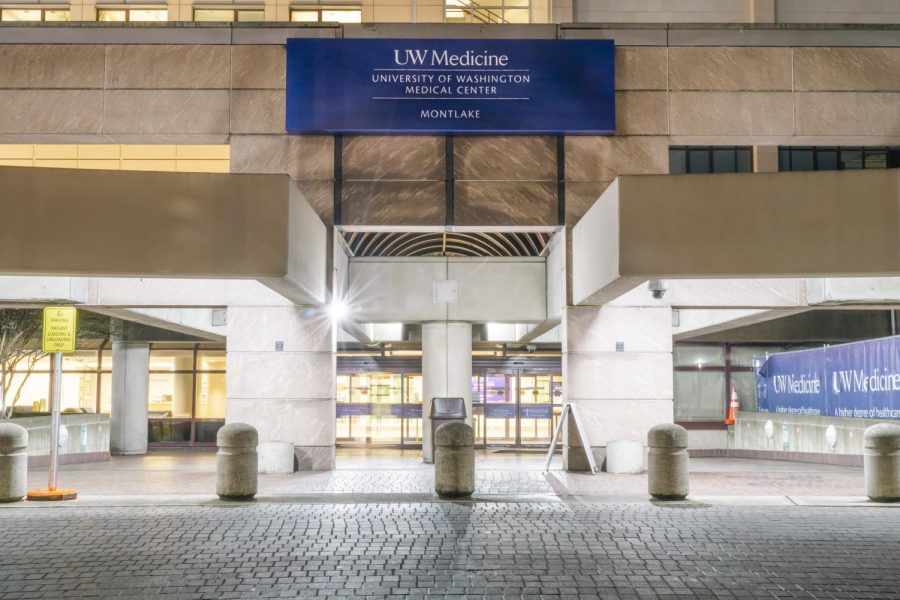UW Launches ACTIONS in Response to Roe v. Wade Overturn
The University of Washington Medical Center, Montlake.
A new medical program is being spearheaded by the University of Washington (UW) with a focus on abortions and other reproductive care including contraceptives and birth. Washington state is quickly becoming a safe haven for people who are seeking an abortion after the Supreme Court overturned its Roe v. Wade decision. The Guttmacher Institute projects that there will be a 385% increase in the number of people coming to Washington for abortion care. The faculty heading UW’s new program believe it is crucial that doctors know how to safely perform one.
Monica McLemore, a UW nursing professor and interim director at UW’s Center for Anti-Racism in Nursing, founded the original Abortion Care Training Incubator of Outstanding Nurse Scholars [ACTIONS] research program at the University of California, San Francisco. In the fall of 2024, McLemore will bring ACTIONS to UW along with UW nursing professor and experienced nurse-midwife Molly Altman and Meghan Eagan-Torkko, associate professor and director of nursing at UW. They will be taking this year to fine-tune the program.
“I’ve been working on developing the free courses that are specific to introducing learners to reproductive justice,” McLemore said.
The first course will be an introductory one-on-one class that anyone can take to learn about the foundations of reproductive justice in an advocacy context. The second set of courses will be open to clinical learners at master’s or doctoral degree levels to learn theories and methodology. The third and final courses will be for people higher up in the doctoral track who want to use reproductive justice as a research frame.
There will be some extra classes for students to do values clarification, which McLemore describes as a process through which learners can critically and humbly analyze their values and the professional values of the field they are entering.
Students will be exposed to lessons surrounding policy implications, counseling patients and hearing from people with lived experiences.
“This is to make sure that our education and training for the future workforce is grounded not only in the course work, but the experiences of people who have experienced reproductive justice firsthand,” McLemore said.
A wide range of individuals meet the criteria to utilize these courses. For the entry-level classes, UW students and the public will be able to partake in the education through a virtual, asynchronous format. McLemore and her colleagues have yet to work out the specifics for the other courses.
“When I moved my entire program to UW early last year, I knew I wanted to expand the ACTIONS program to a focus on team-based clinical learners,” McLemore said.
McLemore and her colleagues hope that the program will give UW students a more cohesive understanding of their patients and the role that sexual and reproductive health plays in their lives.
However, the program’s focus on abortions does not line up with every Washingtonian’s beliefs. The Catechism of the Catholic Church paragraph No. 2271 asserts that abortion is intrinsically immoral.
“Since the first century the Church has affirmed the moral evil of every procured abortion. This teaching has not changed and remains unchangeable. Direct abortion, that is to say, abortion willed either as an end or a means, is gravely contrary to the moral law,” the Catechism states.
Given that Seattle U is a Catholic institution, there is no instruction on abortion procedures or advocacy in the university curriculum, which has drawn praise from anti-abortion activists and criticism from a coalition of students and faculty.
Sami Alloy, deputy director for Pro-Choice Washington, deems open conversation to be the most effective way to educate nurses.
“Speaking about abortion in clear, inclusive and unapologetic terms is necessary for increasing acceptance, comfort and culture change around abortion care,” Alloy wrote to The Spectator.
As Pro-Choice Washington’s mission revolves around advocating for reproductive rights to be available to everyone, Alloy believes ACTIONS will be highly beneficial.
“It’s so important that students receive accurate, non-stigmatizing sexual and reproductive health education,” Alloy wrote.
Alloy claimed that by specifying who can get abortions and by surrounding abortion with euphemism, it only enforces that abortions are something to be ashamed of. She disagrees with this view.
“Having an abortion is a life-affirming, empowering and loving decision that patients make for themselves and for their families,” Alloy wrote.
Archana Kurse, a fourth-year nursing major at Seattle University, loves the idea of a new educational program focused on sexual health and safety.
“During this time of independence and exploration, it would be very supportive to the community to promote safety and provide resources and guidance,” Kurse wrote to The Spectator.
As a nursing student herself, Kurse believes the program will help students feel more empowered, educated and connected to their community. She also appreciates the anticipated accessibility of ACTIONS.
“Programs like this work to advocate for individuals’ safety and share knowledge to those who might not previously have direct access to them,” Kurse wrote.
Although this new program seems to be widely accepted and highly anticipated, Kurse worries that people will criticize ACTIONS for promoting sex. However, she believes the program’s implications are much bigger than sex.
“It is important to provide a safe space and resources for those who are in need of information, especially during this pivotal period of life,” Kurse wrote.
Pro-choice UW students and the larger Seattle community are anticipating ACTIONS and the resources it will provide future activists and healthcare professionals. Meanwhile, pro-life advocates continue to make the case against abortion in blue states including Washington which still allow pregnancy termination. The program is hoping for a positive reception in the Emerald City.


